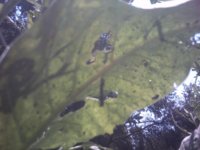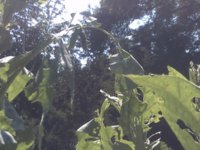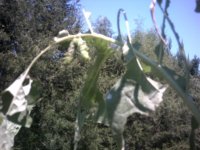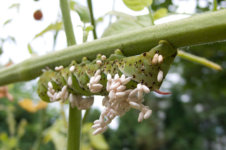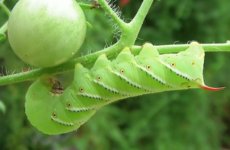Seems like we needed a place for comments about the pros, cons, uses and misuses of insecticides and chemicals on tobacco. This could encompass anti-sucker products as well.
I'll start with the following, which inadvertently hijacked another thread.
1. One of the reasons I grow tobacco is to avoid the chemicals applied to commercial tobacco.
2. Here's a discussion of the toxicity of Sevin (carbaryl), if you're interested - http://www.pesticide.org/get-the-facts/pesticide-factsheets/factsheets/carbaryl
3. Sevin kills bees and other non-pest members of the soil/plant/animal ecosystem.
4. The "inert" ingredients of carbaryl products are seldom tested.
5. Back when arsenate of lead was regularly used to fight hornworms, "tests" demonstrated that it was "safe."
On the same theme, the following news story appeared today:
The pharmaceutical giant Pfizer will voluntarily suspend US sales of a poultry-pumping additive after studies showed it can leave traces of arsenic in chickens' livers, the US government announced on Wednesday.
"Alpharma, a subsidiary of Pfizer Inc., will voluntarily suspend US sales of the animal drug 3-Nitro (Roxarsone), a product used by poultry producers since the 1940s," the Food and Drug Administration said in a statement.
The FDA said a recent study of 100 broiler chickens found that those treated with Roxarsone, which makes their skins more yellow and boosts their growth, had higher levels of inorganic arsenic in their livers than untreated chickens.
The FDA approved 3-Nitro in 1944, when it became the first arsenic-containing new animal drug product approved by the US regulatory agency.
Some poultry farmers use it to ward off coccidiosis, a parasitic disease that attacks animals' intestines. It also helps chickens gain weight and gives a golden color to their skin.
It's taken the FDA nearly SEVENTY YEARS to reconsider their original approval!
Now, I'm not generally an alarmist, but "FDA Approved" doesn't carry much authority, when it comes to even common sense chemical usage.
I do recognize that many fields of agriculture, including tobacco, require chemicals to make any profit. But my tobacco is not under that constraint.
Bob
I'll start with the following, which inadvertently hijacked another thread.
My response:whats so bad about insectides?
1. One of the reasons I grow tobacco is to avoid the chemicals applied to commercial tobacco.
2. Here's a discussion of the toxicity of Sevin (carbaryl), if you're interested - http://www.pesticide.org/get-the-facts/pesticide-factsheets/factsheets/carbaryl
3. Sevin kills bees and other non-pest members of the soil/plant/animal ecosystem.
4. The "inert" ingredients of carbaryl products are seldom tested.
5. Back when arsenate of lead was regularly used to fight hornworms, "tests" demonstrated that it was "safe."
On the same theme, the following news story appeared today:
The pharmaceutical giant Pfizer will voluntarily suspend US sales of a poultry-pumping additive after studies showed it can leave traces of arsenic in chickens' livers, the US government announced on Wednesday.
"Alpharma, a subsidiary of Pfizer Inc., will voluntarily suspend US sales of the animal drug 3-Nitro (Roxarsone), a product used by poultry producers since the 1940s," the Food and Drug Administration said in a statement.
The FDA said a recent study of 100 broiler chickens found that those treated with Roxarsone, which makes their skins more yellow and boosts their growth, had higher levels of inorganic arsenic in their livers than untreated chickens.
The FDA approved 3-Nitro in 1944, when it became the first arsenic-containing new animal drug product approved by the US regulatory agency.
Some poultry farmers use it to ward off coccidiosis, a parasitic disease that attacks animals' intestines. It also helps chickens gain weight and gives a golden color to their skin.
It's taken the FDA nearly SEVENTY YEARS to reconsider their original approval!
Now, I'm not generally an alarmist, but "FDA Approved" doesn't carry much authority, when it comes to even common sense chemical usage.
I do recognize that many fields of agriculture, including tobacco, require chemicals to make any profit. But my tobacco is not under that constraint.
Bob


